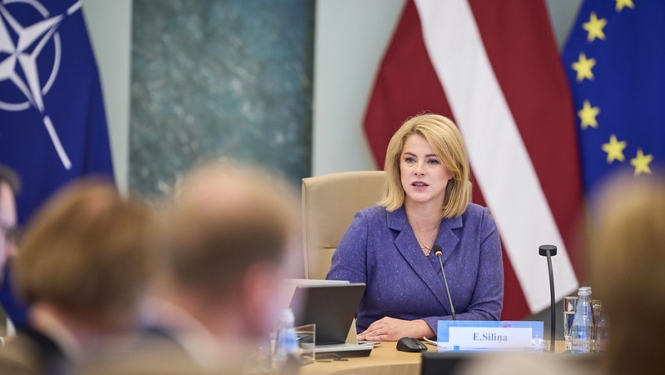On Monday, 14 October, the Cabinet approved the draft law on the State budget 2025 and the budgetary framework for 2025, 2026 and 2027. The consolidated national budget revenue for 2025 is planned in the amount of EUR 15.1 billion, but expenditure – in the amount of EUR 17.1 billion. Internal and external security have been set as the key national priorities.
“Priorities of the security budget for the next year are State defence or external and internal security. Without security, there is no foreseeability, investments, development and welfare. We must be ready that the hostile intentions of our neighbouring country and its ability to implement them against the neighbours will remain. Geopolitical unpredictability and tensions elsewhere in the world will keep affecting Latvia. Therefore, it is very important to invest in resilience of the public authorities and society, to keep us ready and able to overcome any crises and threats both today and in the future,” stresses Arvils Ašeradens, Minister for Finance.
State budget expenses in 2025
10.3% of budget expenses are planned for defence next year, ensuring gradual increase in the budget expenses of the Ministry of Defence to 3.7% of the gross domestic product (GDP) in 2026 (3.5% of the GDP in 2025; 3.7% of the GDP in 2026 and in 2027). Function “Defence” partially includes also the measures related to national internal security, for example, building of technical infrastructure of the external border and strengthening of cyber security.
Whereas, 6.6% of the total budget expenses in 2025 are planned for public order and security, including the highest funding is planned for the Ministry of the Interior (operation of the State Police, fire safety, rescue and civil defence, operation of the State Border Guard and other) and for the Ministry of Justice (judicial system, execution of criminal penalties – prisons and their construction, implementation of probation, and other measures).
More than a third or 33.2% will be directed to social protection of residents in 2025, including to the expenses of the special budget for state pensions, benefits and other measures. Health sector has been assigned 11.0% for the next year, including for the payment of compensated medicines and materials, as well as for emergency medical aid and other measures.
7.2% of the budget expenses are planned for education, including for general education, educational institutions of vocational education, higher education and other measures. Whereas, 1.4% are planned for recreation, culture and religion, including for film industry, art and literature, cultural heritage, sports and other measures.
Significant share or 17.2% of the budget expenses are planned for economic activity, including provision of fair competition, protection of the domestic market and rights of consumers, as well as targeted subsidies for roads, maintenance and renovation of national roads, public transport and Rail Baltica project, as well as other measures. Whereas, 12.5% of the total State budget expenses will be assigned to the general government services, including for contributions to the European Union (EU) budget, national debt management, ensuring State revenue and customs policy, part of payments of the EU funds, subsidy for local governments and science, as well as other measures.
0.4% of the total expenses in 2025 are planned for the environmental protection, including expenses for environmental projects, labour protection, meteorology and hazardous waste management. 0.2% of the total expenses of the next year's budget are planned for the management of territories and housing, including for the implementation of the national regional development policy, support to the planning regions and other measures.
Additional funding for national priorities – internal and external security
Draft budget provides for additional funding for priority measures related to national security, ensuring of execution of a judgement rendered by the Constitutional Court and laws, independent institutions and measures related to changes in tax policy. Generally, it is planned to fund priorities in 2025 in the amount of 392.4 million euro, in 2026 – in the amount of 389.9 million euro, in 2027 – in the amount of 398.7 million euro, and in 2028 – in the amount of 334.8 million euro. For the priority measures related to national security, it is planned to assign the major part of the additionally envisaged funding for priority measures in 2025, amounting to 284.3 million euro in total.
Majority or 167.4 million euro are envisaged for the measures of the Ministry of the Interior; for example, 10% increase in remuneration of the officials of the interior services and prisons with special service ranks, as well as the State Revenue Service Tax and Customs Police Board, as well as support to the Ukrainian civilians in Latvia. Likewise, it has been envisaged to extend intensified border protection system operation regime and provide purchase, renewal and maintenance of the State material reserves.
In 2025, assignment of 90.3 million euro is planned for the measures of the Ministry of Defence. This amount includes 50 million according to the signed contract regarding military support provided for Ukraine. Whereas, 23 million euro are envisaged for supplementing ammunition stocks and provision of individual equipment, 15 million – for purchase of radars for wind park development and 2.3 millioneuro – for improvement of access road of the military firing ground “Sēlija” and rebuilding of the unit bridge in Daugavpils for mobility improvement purposes, with the funding envisaged within the framework of the EU fund projects.
Additional 5 million euro are envisaged for strengthening the priority areas of the State Security Service, another 5 million euro – for the ensuring of operation of the Constitution Protection Bureau. It has been planned to direct the funding of the EU fund planning period programme 2021-2027 for the strengthening of the necessary cyber security in nearly all sectors.
Changes in tax policy
Proposal of changes in labour force tax policy provides for increase in net income for approximately 95% of the employed residents or all whose gross monthly salary amounts to up to 4,000 euro. The highest increase is provided just for the employees with remuneration of up to 2,500 euro.
It is planned to set a fixed non-taxable minimum for all salaries 510 euro per month from 2025, and, as of 2026 – to increase this amount to 550 euro, and in 2027 – to 570 euro per month. Increase of non-taxable minimum for pensioners from 500 to 1,000 euro per month is planned next year. Minimum wage will grow from 700 to 740 euro per month in 2025; in 2026 – to 780 europer month, from 2027 – to 820 euro per month, from 2028 – to 860 euro per month.
Increase of benefits of employed parents to 75% of the amount of the assigned parental benefit is planned (currently – 50%). Expansion of relief of personal income tax (PIT) for collective agreements (for mobility) to 700 euro per year is also envisaged.
Balancing the non-taxable amount with PIT rates and for the purposes of simplification of labour force tax system, unified PIT rate is planned for annual income of up to 105,300 euro (8,775 euro per month) – 25.5%. Tax rate on income exceeding 8,775 euro per month will be 33%.
The government has approved also the draft Solidarity Contribution Law providing for generation of additional funds for the ensuring of the State national security fiscal needs under the circumstances of increased national security risks. It is planned to apply solidarity contributions to the period from 2025 to 2027. The developed model provides that credit institutions increase contributions to the State budget that will ensure funding for the national security needs expected to grow in the upcoming years. Increase in contributions can take place directly by making solidarity contributions to the state budget, or indirectly by significantly increasing the crediting amounts and thus also economic activity and amount of budget revenue.
Cooperation with partners and local authorities
During the budget preparation process, discussions were held with social and cooperation partners, as well as with the Latvian Association of Local and Regional Governments (LALRG), and the Memorandum of Understanding and Disagreement between the Cabinet and the LALRG was drawn up. The government has envisaged financial resources in the draft budget 2025 that will fully compensate impact of tax changes on municipal budgets. Agreement has been reached for the division of municipal revenue by setting the PIT proportion of 78% in 2025 to local governments and 22% to the State budget. Part of the funding from compensation will be divided according to the PIT division principles, and increase in municipal financial equalisation fund (MFE) subsidy by 14 million euro is provided for.
In 2025, for all municipalities, an average increase of 10.4% in equalized revenue (combined with the funding for the municipalities at the EU’s external border) is planned compared to 2024. The approved proposal ensures regionally balanced growth in funding for all municipalities, including planned additional assignment of subsidy in the amount of 2.5 million euro from the State budget for five municipalities at the EU’s external border.
Surplus of the PIT projection is offered to be directed to repayment of the municipality’s loan obligations. This solution corresponds to the requirements of the EU Directive and the new economics management model.
The draft law package accompanying the state budget 2025 contains 31 draft laws. The draft law package of the state budget 2025 submitted to the Saeima on 15 October.





